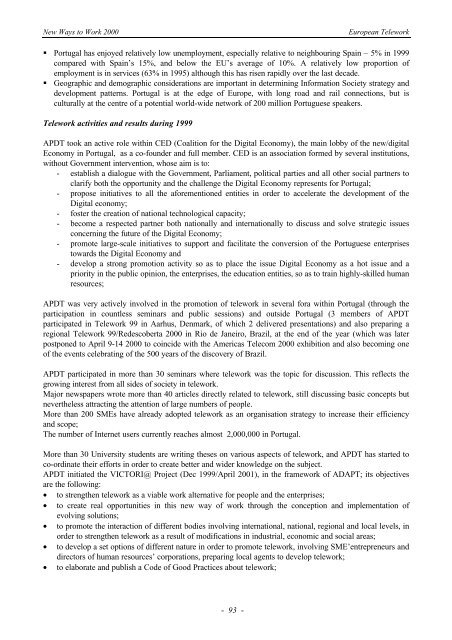eWORK 2000 - European Telework Week
eWORK 2000 - European Telework Week
eWORK 2000 - European Telework Week
- No tags were found...
You also want an ePaper? Increase the reach of your titles
YUMPU automatically turns print PDFs into web optimized ePapers that Google loves.
New Ways to Work <strong>2000</strong><strong>European</strong> <strong>Telework</strong>• Portugal has enjoyed relatively low unemployment, especially relative to neighbouring Spain – 5% in 1999compared with Spain’s 15%, and below the EU’s average of 10%. A relatively low proportion ofemployment is in services (63% in 1995) although this has risen rapidly over the last decade.• Geographic and demographic considerations are important in determining Information Society strategy anddevelopment patterns. Portugal is at the edge of Europe, with long road and rail connections, but isculturally at the centre of a potential world-wide network of 200 million Portuguese speakers.<strong>Telework</strong> activities and results during 1999APDT took an active role within CED (Coalition for the Digital Economy), the main lobby of the new/digitalEconomy in Portugal, as a co-founder and full member. CED is an association formed by several institutions,without Government intervention, whose aim is to:- establish a dialogue with the Government, Parliament, political parties and all other social partners toclarify both the opportunity and the challenge the Digital Economy represents for Portugal;- propose initiatives to all the aforementioned entities in order to accelerate the development of theDigital economy;- foster the creation of national technological capacity;- become a respected partner both nationally and internationally to discuss and solve strategic issuesconcerning the future of the Digital Economy;- promote large-scale initiatives to support and facilitate the conversion of the Portuguese enterprisestowards the Digital Economy and- develop a strong promotion activity so as to place the issue Digital Economy as a hot issue and apriority in the public opinion, the enterprises, the education entities, so as to train highly-skilled humanresources;APDT was very actively involved in the promotion of telework in several fora within Portugal (through theparticipation in countless seminars and public sessions) and outside Portugal (3 members of APDTparticipated in <strong>Telework</strong> 99 in Aarhus, Denmark, of which 2 delivered presentations) and also preparing aregional <strong>Telework</strong> 99/Redescoberta <strong>2000</strong> in Rio de Janeiro, Brazil, at the end of the year (which was laterpostponed to April 9-14 <strong>2000</strong> to coincide with the Americas Telecom <strong>2000</strong> exhibition and also becoming oneof the events celebrating of the 500 years of the discovery of Brazil.APDT participated in more than 30 seminars where telework was the topic for discussion. This reflects thegrowing interest from all sides of society in telework.Major newspapers wrote more than 40 articles directly related to telework, still discussing basic concepts butnevertheless attracting the attention of large numbers of people.More than 200 SMEs have already adopted telework as an organisation strategy to increase their efficiencyand scope;The number of Internet users currently reaches almost 2,000,000 in Portugal.More than 30 University students are writing theses on various aspects of telework, and APDT has started toco-ordinate their efforts in order to create better and wider knowledge on the subject.APDT initiated the VICTORI@ Project (Dec 1999/April 2001), in the framework of ADAPT; its objectivesare the following:• to strengthen telework as a viable work alternative for people and the enterprises;• to create real opportunities in this new way of work through the conception and implementation ofevolving solutions;• to promote the interaction of different bodies involving international, national, regional and local levels, inorder to strengthen telework as a result of modifications in industrial, economic and social areas;• to develop a set options of different nature in order to promote telework, involving SME’entrepreneurs anddirectors of human resources’ corporations, preparing local agents to develop telework;• to elaborate and publish a Code of Good Practices about telework;- 93 -








